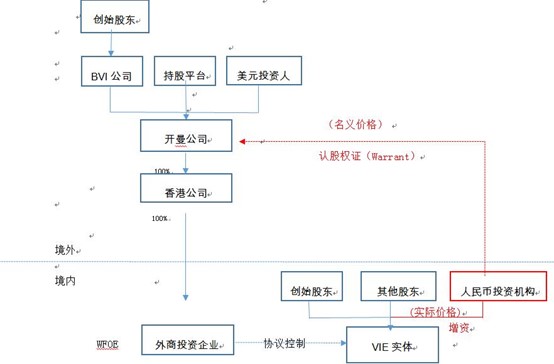In 2022, Jiangsu Paiting Law Firm represented China Company A to file an arbitration with the Beijing Arbitration Commission, requesting Company B and its founders, who had increased the capital of Company A, to fulfill the obligation of equity repurchase in accordance with the Investment Agreement signed by all parties, and Company B hired the top partner team of Red Circle Law Firm in China as the attorney to respond to the lawsuit. After more than a year of arbitration proceedings, the arbitration tribunal made an award on the equity repurchase case, and our team of lawyers helped Company A to successfully win the case, and Company B as well as the controlling shareholders should pay 37.5 million RMB for the repurchase.
Case Review
Company B is an e-commerce company with VIE structure. When launching the B+ round of financing, Company A subscribed part of the new registered capital of Company B in RMB and signed an Investment Agreement, which stipulated that if Company B did not complete the qualifying listing in 4 years, Company B and its founders would redeem the equity held by Company A at the agreed formula price. The parties and other investors then signed a Capital Increase Agreement. On the same day Company B's offshore controlling entity, Cayman Corporation, issued warrants to Company A at a nominal price of $0.0001 and provided for the repurchase of the Series B+ equity in its articles of association. A dispute was eventually formed when Company B failed to complete the listing as agreed.
Focus of the Dispute
Company B is a VIE structure and the relevant interests are vested in the Cayman company, but the investment is made by Company A in RMB in a domestic company.
1. Whether the Capital Increase Agreement was established to replace the Investment Agreement?
Compared to the Investment Agreement, the Capital Increase Agreement is executed after the Capital Increase Agreement and lacks redemption clauses, while there are complete agreement terms that may replace the Capital Increase Agreement with redemption clauses.
1.1 Complete Agreement Clause
The clause is an import from the common law, but also one of the common contract general terms, according to the civil code, article 142, the interpretation of the contract terms "should be in accordance with the words used, combined with the relevant provisions, the nature and purpose of the act, custom, and the principle of good faith, to determine the meaning of the meaning of the expression of meaning." Even though the terms of the complete agreement in the context of Chinese law can be interpreted in a somewhat expansive manner, whether or not it can be understood that the present contract supersedes all previous agreements depends on the agreement text. The complete agreement clause in the Capital Increase Agreement adopts the full agreement on the "matters described herein", the matters described herein are literally the matters covered in the Capital Increase Agreement, that is to say, the matters expressly agreed in the Capital Increase Agreement, which can replace any previous agreement. The Redemption Clause, on the other hand, is not covered by the Capital Increase Agreement and cannot replace the relevant agreements in the Investment Agreement on this basis.
1.2 Transaction Structure.
Generally speaking, RMB investment in VIE projects requires ODI foreign investment filing and foreign exchange registration, and RMB funds are invested in overseas controlled entities, but with the strengthening of national regulation of outbound funds in 2017, the difficulty of ODI approval has increased significantly and the cycle has been longer, and the original transaction model is facing greater uncertainty, which has given rise to more diverse transaction paths. One of the more common structures is the domestic shareholding + offshore warrants adopted (as shown in the chart).

The transaction structure also has another feature, which is to facilitate the subsequent dismantling of the VIE, with the Shanghai Free Trade Zone in 2015 to cancel the restrictions on the proportion of foreign equity in the operation of e-commerce, e-commerce enterprises to dismantle the VIE to return to the A-share listings have been no policy obstacles, Company B also does exist to dismantle the VIE plan, the lawyers of our company by combing through the pre-communication documents to find the relevant evidence, which further confirms that the terms of the domestic repurchase It was in line with the original and genuine transaction arrangement between the two parties and did not need to be replaced. By going through thousands of pages of Cayman company's financing documents in English, our team finally obtained the support of the arbitration tribunal
2. Is the redemption obligation a breach of contract?
There is an essential difference between a right of redemption and liquidated damages. Liquidated damages are premised on the breach of contractual obligations; whereas a right of redemption is based on a specific future event. Once triggered, the redemption clause gives rise to the right and obligation to redeem and does not involve the breach of pre-existing contractual obligations. The retrieval of case and authority citations makes our argument more persuasive.
Conclusion
Our lawyers demonstrated professionalism, care and responsibility, overcoming the difficulties of the epidemic and ultimately promoting the arbitration process, which led to the arbitral tribunal supporting the claimant's request.
Our team consisted of Ms. Shan and Mr. Kuang, and the case received strong support from law schools of well-known universities.

